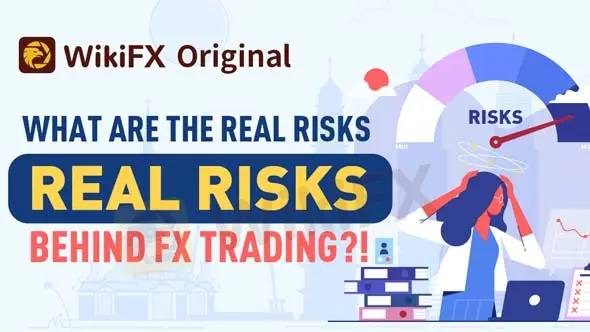简体中文
繁體中文
English
Pусский
日本語
ภาษาไทย
Tiếng Việt
Bahasa Indonesia
Español
हिन्दी
Filippiiniläinen
Français
Deutsch
Português
Türkçe
한국어
العربية
What Are The Real Risks Behind FX Trading?!
Abstract:The first rule of Forex trading, or any other type of trading for that matter, is to only risk money you can afford to lose. Many traders, particularly beginners, disregard this rule because they believe it "won't happen to them." However, there are numerous risks associated with forex trades because they are leveraged products that can result in significant losses

When you use debt to fund your trades, you engage in leveraged or marginal trading. Both of these activities significantly increase the risk you take and the likelihood that you will owe much more than you did initially.
The amount of capital you could lose in a single trade, as opposed to the risks mentioned previously, is referred to as trade risk. It is calculated by multiplying the position size by the pip value by the difference between your entry price and the price at which your stop-loss order takes effect.

While you can use leverage to fund your trades and be successful, the risks are so high that not using leverage is the best way to manage the risks involved.
The 1% rule is one of the most effective methods for reducing trade risk. If you have $10,000 in your account, the most you should risk on a trade is $100. If you have $20,000 in your account, you should not risk more than $200 per trade.
On the other hand, another type of risk that many traders often overlook is the risk of being caught in the trap of scam forex brokers. It is crucial to always do your due diligence before engaging with any forex broker. Nowadays, you only need a few seconds and a few clicks to start your research. It could be as simple and efficient as downloading the free WikiFX app from Google Play or App Store and then looking up that broker in question in our database. This straightforward and self-explanatory method could save you a lot of future trouble.

Disclaimer:
The views in this article only represent the author's personal views, and do not constitute investment advice on this platform. This platform does not guarantee the accuracy, completeness and timeliness of the information in the article, and will not be liable for any loss caused by the use of or reliance on the information in the article.
Read more

Oleg Mukhanov Steps Down as TradingView CEO Amid Leadership Shakeup
In a surprising announcement on Thursday, Oleg Mukhanov, who has been at the forefront of TradingView’s growth over the past few years, revealed his decision to step down as CEO. Mukhanov, who ascended to the role in January 2024 after joining the technology giant in mid-2022 as Group Chief Financial Officer, will continue to serve as an advisor to TradingView’s board.

Forex Trading: Scam or Real Opportunity?
Meta: Explore forex trading: Is it a scam or real opportunity? Learn how it works, debunk myths, manage risks, and avoid scams with tools like WikiFX App. Start trading safely today!

T&D vs AvaTrade: Which Broker Suits Your Trading Needs in 2025?
In this article, we compare these brokers based on basic information, regulatory status, leverage, trading platforms, account types, spreads and commissions, customer service, AI tools, and recent updates. Our goal is to provide an objective overview so you can decide which broker aligns better with your trading style and requirements.

5 Arrested in the TriumphFX Investment Scam Investigation
Malaysian authorities have intensified their investigation into the TriumphFX foreign exchange investment scam, resulting in the arrest of five individuals linked to the fraudulent scheme.
WikiFX Broker
Latest News
Is $CORONA Memecoin a Legit Crypto Investment?
Is Pi Network the Next Big Crypto Opportunity?
Donald Trump’s Pro-Crypto Push Boosts PH Markets
Japan’s Shift in Crypto Policy and What It Means for Investors
Is Linkbex a Scam? SFC Warns of Virtual Asset Fraud in Hong Kong
5 Best Copy Trading Brokers: You Can Trust in 2025
3 EXCLUSIVE Ramadan Offers That Won’t Last Long! ACT NOW
The Next Crypto Giants: 5 Altcoins to Watch
Forex Trading: Scam or Real Opportunity?
The Hidden Tactics Brokers Use to Block Your Withdrawals
Currency Calculator






